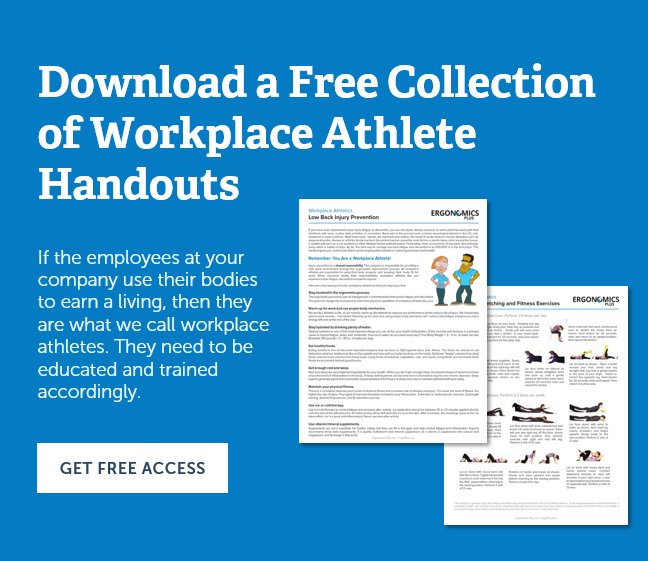Editor’s Note: Injury prevention and wellness handouts are an effective (and inexpensive) way to educate and motivate employees to use good work practices and take care of their bodies.
Scroll to the bottom of this post for the free Wellness Handout PDF file.
—
Reducing Stress in the Workplace
Are you stressed?
According to NIOSH:
- 25% of employees view their jobs as the number one stressor in their lives.
- 75% of employees believe the worker has more on-the-job stress than a generation ago.
- Problems at work are more strongly associated with health complaints than are any other life stressor; more so than even financial problems or family problems.
Causes of Stress
Stress is defined as, “Pressure or tension exerted on an object.” By that definition, everyone will experience some amount of stress in their lives. The key is to minimize stress to prevent it from taking a negative toll on your life and health.
The major causes of stress are life issues such as major life changes, stress in the family, emotional issues, financial problems and your job.
Stress Takes a Toll on Your Body
Stress has many adverse effects to your overall health and well being.
Some of the early warning signs of stress are: headaches, sleep disturbances, difficulty concentrating, short temper, upset stomach, job dissatisfaction and low morale.
In addition to these symptoms, according to NIOSH, stress puts you at a higher risk for cardiovascular disease, musculoskeletal disorders, psychological disorders and workplace injury.
Tips to Reduce Stress
- Keep a positive attitude.
- Accept that there are events that you cannot control.
- Be assertive instead of aggressive. Assert your feelings, opinions, or beliefs instead of becoming angry, defensive, or passive.
- Learn and practice relaxation techniques; try meditation, yoga, or tai-chi for stress management.
- Exercise regularly. Your body can fight stress better when it is fit.
- Eat healthy, well-balanced meals.
- Learn to manage your time more effectively.
- Set limits appropriately and learn to say no to requests that would create excessive stress in your life.
- Make time for hobbies, interests, and relaxation.
- Get enough rest and sleep. Your body needs time to recover from stressful events.
- Don’t rely on alcohol, drugs, or compulsive behaviors to reduce stress.
- Seek out social support. Spend enough time with those you enjoy.
- Seek treatment with a psychologist or other mental health professional trained in stress management or biofeedback techniques to learn healthy ways of dealing with the stress in your life.
Source: Web MD
